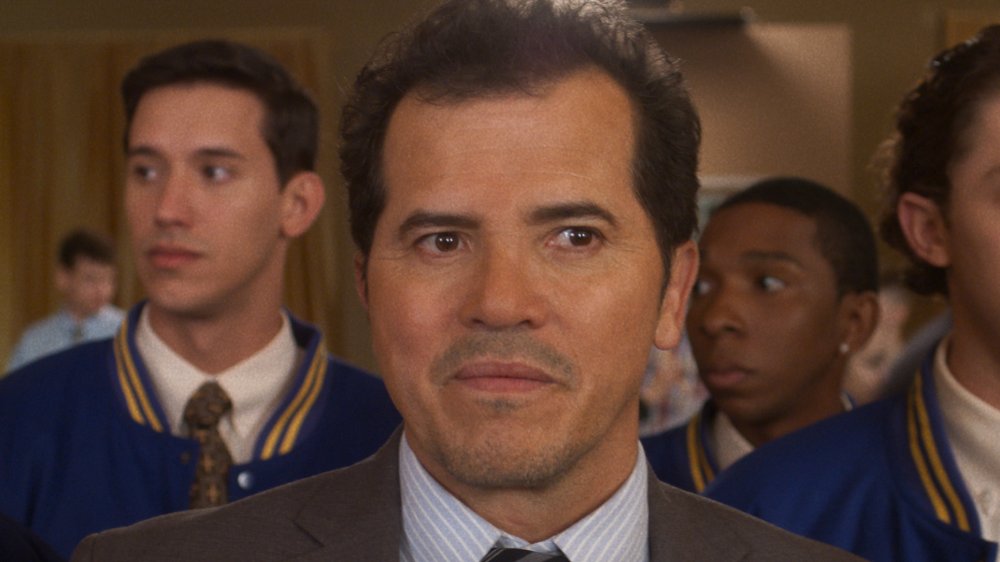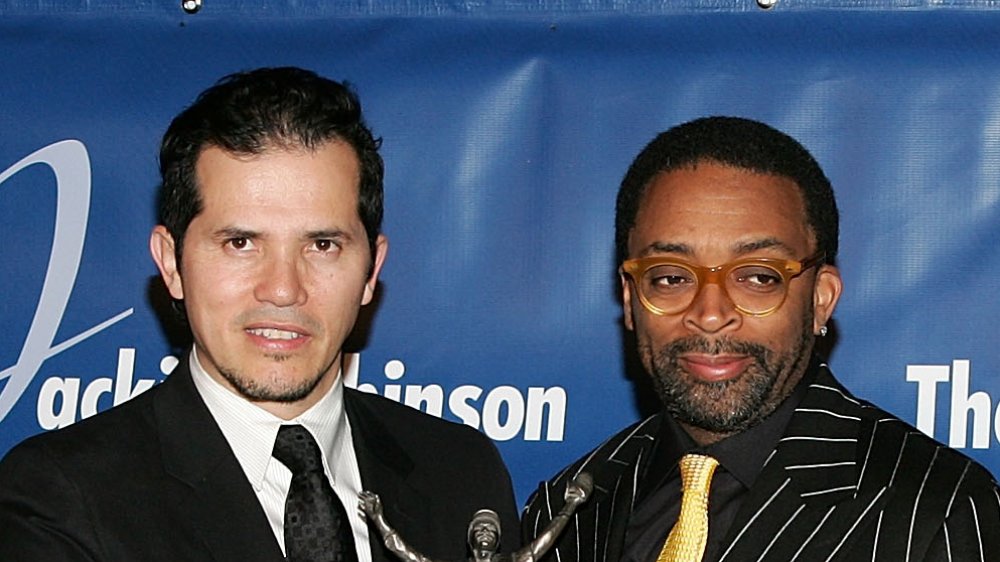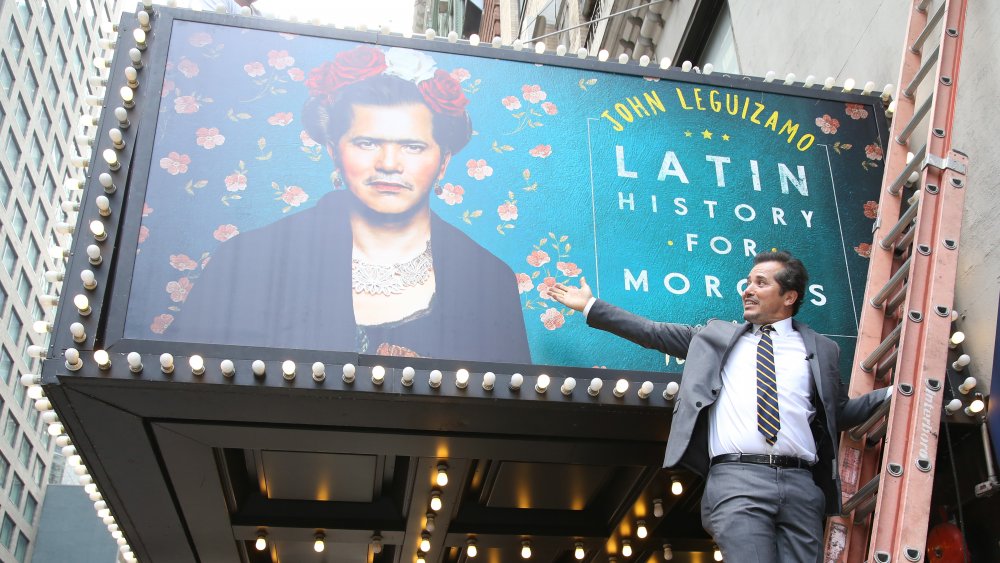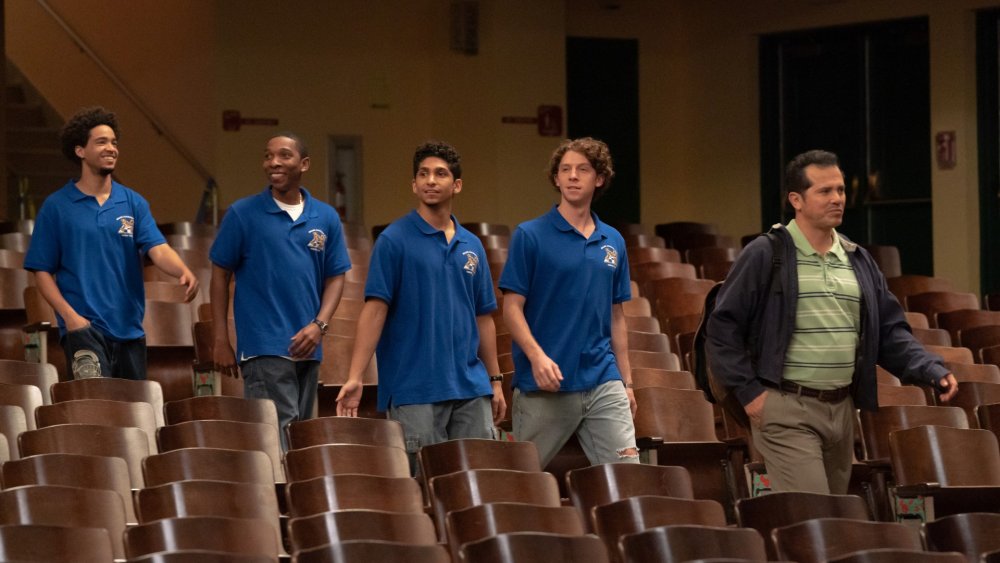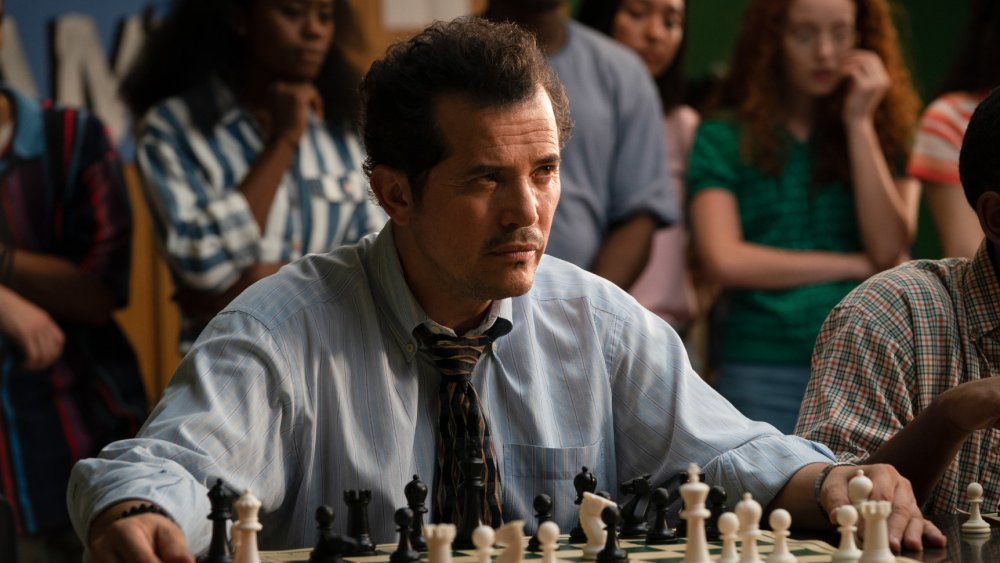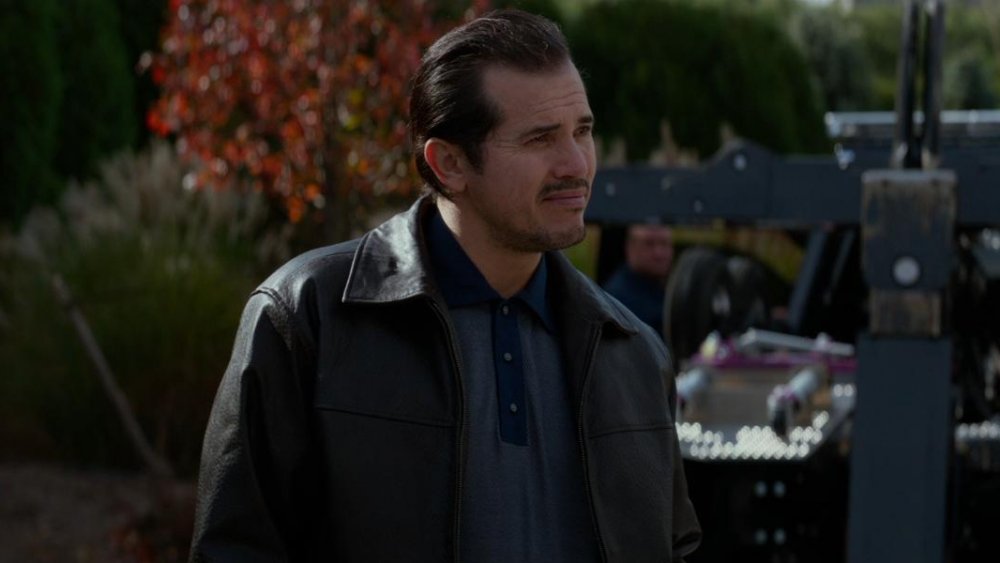John Leguizamo Talks Critical Thinking, John Wick, And More - Exclusive Interview
With more than 140 credits in film and television (and even more on stage) since 1984, John Leguizamo is one of the hardest-working talents in the entertainment industry. And while most actors would be happy with so many turns in front of the camera, Leguizamo's is clearly determined to take his work to the next level. In fact, to further enhance his already impressive resume, he's directed the new chess drama Critical Thinking, which debuted on video on demand September 4.
Leguizamo is no stranger to directing — he helmed the HBO boxing drama Undefeated in 2003 — but this time around, he went back behind the camera with all of the knowledge he's accumulated working with several acclaimed filmmakers.
In addition to directing Critical Thinking, Leguizamo plays the supporting role of Mario Martinez, a real-life high school teacher and coach who in 1998 guided the Miami Jackson High School chess team to becoming the first inner-city school in history to win the U.S. National Chess Tournament. The incredible true-life event transformed the lives of the team's five players — Sedrick Roundtree (Corwin C. Tuggles), Ito Paniagua (Jorge Lendeborg Jr.), Rodelay Medina (Angel Bismark Curiel), Gil Luna (Will Hochman) and Marcel Martinez (Jeffry Batista) — showing the Latinx and Black youth possibilities they once believed were beyond their reach.
Leguizamo discussed the making of Critical Thinking — along with several other highlights from his eclectic, prolific career — with Looper in an exclusive interview.
Learning from the best
There's a wonderful quote from your Romeo + Juliet and Moulin Rouge! director Baz Luhrmann: "A life lived in fear is a life half-lived." And in fact, Baz uses it as an emblem on all his pictures. And obviously, because you've worked with Baz, you know his enthusiasm, you know his love for making films. I can't help but think that because you've had such of a wonderful career, you live by that motto, too — and maybe part of living that full life is doing something you haven't done before, which would be directing a feature film.
Yeah, absolutely. I mean, I learned a lot from all the directors I've worked with, but especially the great ones like Baz and Spike Lee and Brian DePalma. And they're fearless. You can't make great art with fear and that's the beauty of art, is it's a place where you feel you can expand your boundaries and you can test yourself and you can challenge yourself in ways that you can't in real life. And one of the things that I wanted to try in life was to direct — and I've directed before — I wanted to do it right because I have such huge respect for directors. I did an HBO boxing movie and I've done some commercials, and this was my first, my debut, as an independent film director.
You mentioned Spike Lee. Which other directors in particular inspired you? Because I would imagine, even though you're acting, that becomes part of your actor's DNA and that's something you carry forth with you.
It's so amazing that you said that because it did become part of my chromosomal information, from all these directors I've worked with, that I didn't realize. This was the first time that I realized I had this backlog, this catalog, of problem-solving techniques from Baz Luhrmann, Spike Lee [Summer of Sam], Brian DePalma [Casualties of War and Carlito's Way], Tony Scott [Revenge and The Fan], Brad Furman [The Lincoln Lawyer] — a lot of great directors. I learned how to rehearse with actors, the importance of rehearsal for film, because nobody ever takes that seriously, the power of improv, talking about character with the actors, and just a lot of things, problem-solving with crew, and the dysfunction and all the things that happen on a low-budget movie, which is a lot.
And you're also a glutton for punishment because you put yourself in front of the camera, too, for Critical Thinking. That's quite a challenge.
It is. When I first did it, I did it for Infamous, the boxing movie I directed, and I was a lead and that was too difficult. But this time, I'm part of an ensemble, so I'm not the lead, and that made it a lot easier for me. And it wasn't boxing, I was a teacher, so it was a little easier, but it's not easy. Yeah, you're right. And that's why I told the actors, "We need a week's rehearsal before we start shooting. I need you to show up on the set knowing every chess move and all your lines, and then we're going to have fun."
Establishing identity, making your own history
I loved Critical Thinking in the broad sense in that it's about discovering your identity — the sort of identity that these youth can't find in history books, so it's time to find their own identity through chess. Chess is truly the great equalizer, like you say in the film, and what becomes of that is an opportunity for them to write their own history. What a beautiful story that is, and I'm quite amazed, to be quite honest with you, that it took so long for this story to be made. I mean, this happened in 1998.
I know, but that's kind of part of a problem in the industry, Latin exclusion, because why was this movie so hard to make? It was really well written by Dito Montiel and I pitched it around and you just don't see the value at studios and streamers, you don't see the value of a Latin story. That's why I had to do it independently. They were telling me, Hollywood wisdom, "Latin people don't want to see Latin people," and "Latin people don't want to see feel-good movies" — all this BS and you're like, "Come on, man." We're the largest ethnic group in America, we're 25% of the U.S. box office, but with less than 3% of the faces in front of the camera and way less behind it and less than 1% of stories. And then you see where the problem is. The problem is the studios, because there are no Latin executives. They don't see our stories as valuable.
Those experiences are also the story of your life, in a sense, because I saw some previous interviews of yours, where you were talking about only being offered the drug dealer role or thug role. Because of that you said, "Okay. I'm going to create my identity," and your one-man show Mambo Mouth is the way you did it and you pretty much you left everything else in the rearview mirror after that. That to have been a pivotal moment in your career.
Oh, it was huge. It was huge for me. It was a turning point. The coin dropped in, the proverbial coin, and it was the "a-ha!" moment. I realized I didn't see myself represented anywhere and I couldn't identify. There were no stories that were about me or my people, and I felt like I needed to do something to acknowledge that. So I wrote Mambo Mouth and then boom! Critics loved it, white audiences and black audiences loved it, and Latino audiences found me. And when Latin audiences found me, that was the turning point because we found each other. And now I could create for them and they could come and support and then became sort of a nurturing spawning ground for a lot of future writers and creators and performers. So, I'm glad to be a part of that revolutionary moment.
Leading a new generation of actors
Obviously as a director you have to wrangle a lot of people and everything else. But at the end of the day, you are a storyteller. With Mambo Mouth, Ghetto Klown, and Latin History for Morons, you brought with you to Critical Thinking the greatest sensibility you could have as a director, which would be as a storyteller, ultimately.
It was a convergence of all things, and yeah, I was ready to helm and I've always been a huge lover of storytellers. I just have a huge respect for storytellers, whether books, movies, through song, through poetry. I love storytellers — that's my calling.
Also part of your actor's DNA is the voice work that you've done, including the lovable Sid from Ice Age.
Sid the sloth lives on!
What's great about that role — and people should not discount it because when you're doing a voice role — is that it really requires a lot of nuance. And nuance is especially important with a character drama like Critical Thinking. You're telling the story through these five young leads. You get to be a teacher onscreen, but you also get to be a teacher in a sense when you're directing, because you're teaching these younger performers something that you've learned through doing voice roles and doing other roles.
Right. If you pass on it, it becomes an apprenticeship.
You're teaching nuance, which is a tough thing.
Yeah. Absolutely. You're teaching them how to get to the reality of a scene, how to be themselves in a character. And it becomes an an acting workshop, it does become a masterclass. We're talking about scene structuring, and we're talking about characters and I'm making them aware of a lot of things, and also telling them what the camera sees and if they believe what they're doing, the camera will believe it. They don't need to add extra or embellish more. Embellish in the small things. And then we improvised a lot because I really wanted to blur the lines between reality and film. I didn't want to hear the commas and the semicolons in dialogue. I wanted it to feel really natural.
Making his move
You must be an avid chess player, otherwise a project like Critical Thinking wouldn't have attracted you.
Yeah. I've always liked chess. I've never been really good at it. I played those guys in Washington Square Park, which was a big deal. There used to be these great chess players at Washington Square Park, and you would sit there, and you play them for money. And I lost a lot of money there, let's just put it that way (laughs). But I love chess, and I wanted to figure out how to make it like a sport. I studied a lot of tournaments on YouTube and I talked to a lot of chess players, and so I had to try to figure out how to make this as exciting as it feels to the player, because it's very different to watch a chess game.
And what I do love about chess, like you said before, is it's the great equalizer. There are a lot of these kids like I was myself, ghetto nerds. You grew up in these tough neighborhoods and your only choices sometimes are a nefarious route or sports. And what if you don't want to play football? You know what happens if you don't want to go down the wrong path, what do you got? You're a nerd, there's no space for us. And that's what I love about Mario Martinez. He created this elective, this after-school program to give those kids a place to find themselves and to experiment with themselves.
I think that's probably where I got really teary-eyed. I don't want to be giving away too much, but I'm really glad that you involved these original guys in the movie.
I had to.
That was the slam-down exclamation point part of the film. That was completely necessary. And what I also love about it, John, is while it's a feel-good movie — a feel-great movie — you had to go to some dark places, too. You have to show, unfortunately, a student being shot, you have to show Sedrick's adversity with his father, you have to have Mario talk about a tragic part of his life. And that, to me, that completes it. I imagine that must be exciting for you, telling a complete story. I love that the film ends on an upbeat note, but I think I'm much more moved by it, emotionally, because of knowing all the characters' tragic backstories.
Yeah. I thought they were really important, the backstories. And Dito Montiel really brought them out. And I love that because that's the reality of what these kids were living through. They were living these tough lives and the amazing thing is that these intellectual beings exist in these tough neighborhoods. And how do we save them? How do we nurture them? How do we let them shine? And that's the real pain and tragedy for me, is all these wasted lives, sometimes, that happened in these neighborhoods that could have been. There's so many could have beens and should have beens, and that's really what's sad to me. But we wanted to show the dark side and the bright side, because even in these neighborhoods, there's a lot of joy, there's a lot of happiness, there's a lot of great minds, and I wanted to show the whole complete picture so you understood. So you were there. You were living through them.
And there's Ito Paniagua — his is the toughest story out of all the kids. It was wonderful seeing him in real life in the footage, because again, that just makes the story that much better.
Yeah. When you see these guys on the EPK or the BTS — the behind-the-scenes footage — he says that chess saved his life, you can't help but get teary-eyed and understand that Mario Martinez's teacher really gave of himself and really believed in these kids, and he passed that love onto them and they needed to feel that love, to feel like they were worth something.
Making Critical cuts, understanding John Wick edits
I would imagine one of the toughest parts of directing a feature film the first time out is that there's a lot of story to fit into a two-hour frame. Of course, you've had a great career where you've had roles in shows like Waco, When They See Us, and Bloodline, where the characters are given so much more time to breathe. But being behind the camera, it takes a lot discipline all of a sudden to get that story, in a meaningful sort of way, into a two-hour frame.
Well, I am a huge fan of the two-hour container, whether it's a play or a movie. I find there's such beauty in that limit of time, because you have to tell that whole character arc, beginning, middle and end, in the hour, hour 45, whatever it is, hour 50, and I find that that's where the poetry comes in. I'm a fan of those streaming series. But as a storyteller, I love the two-hour frame because you have to be concise, you have to make every second count. There's no wasted time, and I love that. To me, it's the most perfect storytelling.
Still, I'm sure, you had to make sacrifices where you had to let go of certain scenes.
Yeah. There was a lot of stuff that got cut that was so painful, some amazing sequences, like a fight between Ito and me at a moment that became really tender but was really volatile. And it took a lot of effort as actors and men to go to these dark places and then to love each other. That was a beautiful moment that really pained me to lose. Then there was a lot of other stuff that was important in the script, but not so important once you saw it and you go, "I understand that. I don't need to see it. It's more powerful if I don't see it."
I'm going to touch on kind of a sensitive area here, because I saw an interview where you weren't too happy about it, but regarding John Wick and the filmmakers cutting out a lot of your time out of Chapter 2 ...
And then being cut out completely out of 3.
Cutting you completely out.
Yeah. No longer in the franchise.
Do you have a better understanding now, maybe a little bit more empathy, with the filmmaker or filmmakers? I wanted to see more of you, man, and hopefully...
Yeah, so did I.
But by directing Critical Thinking, does it make you realize that, "Okay, I guess I kind of understand what they did with John Wick."
Yeah, as an actor, I don't, but as a filmmaker, I do. So I have to make peace with myself. As a filmmaker, yeah, there's a lot of great performances that sometimes have to go. And as an actor, it's impossible. That part of you that knows that you did great work and funny and really inventive stuff that didn't get seen, it'll always — you'll always hurt.
Yeah. Because I understand you had a fight scene in Chapter 2, was it?
In 2. In 2 I had a fight sequence, I had a backstory... I had a whole plot. Someday I'll share the script of it.
That's great. Because for Aurelio, it's like, "Hey man, I can do more than run a chop shop here. I mean, come on, man. Get me to do something here."
Yeah. They could use a little bit more of my character, yeah. But you know what, I'm cool. All this stuff leads me to other great aspects of life. Being shut down there opened this up. If I did John Wick 3, I wouldn't be doing Critical Thinking.
Absolutely. This whole idea of this one door closes, the other one opens. It's absolutely true.
Yeah, it's true.
And I think you've talked about that, too. Look, people can really be dejected by failure.
As an actor, I've been rejected my whole entire life. Luckily my growing up prepared me for Hollywood, or Holly-wouldn't (smiles).
That builds character, though, doesn't it?
It does. It makes you strong. It forges you.
Getting back to John Wick, as preliminary an answer it may be, but if they ask you to do 4 and 5, would you come back?
Yeah. If they ask me, I'm not going to say no. I'm not an idiot. (Laughs)
